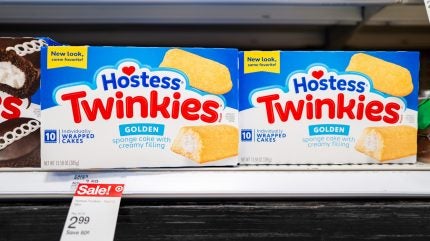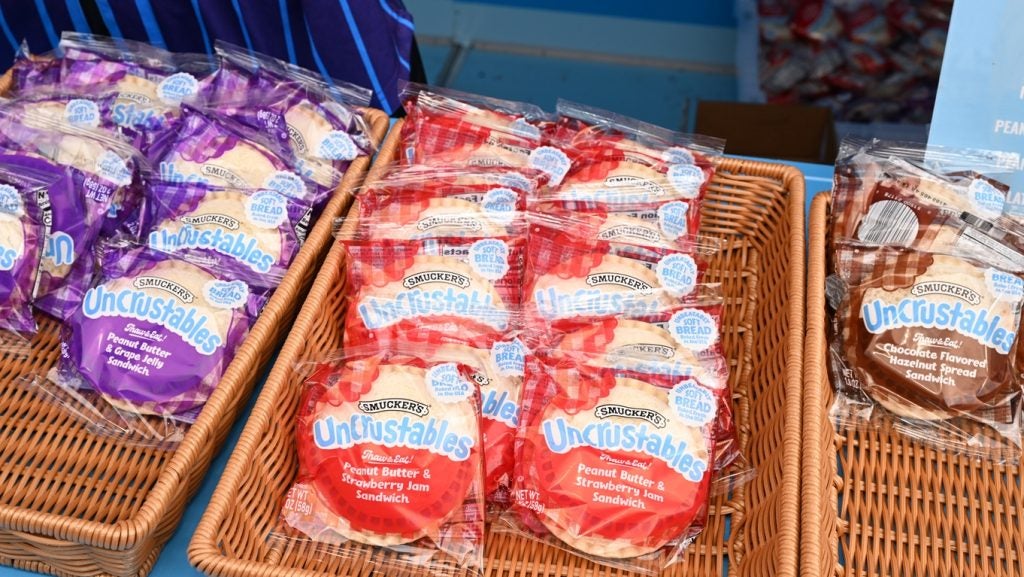
JM Smucker’s eye-catching move for Twinkies owner Hostess Brands in 2023 divided opinion, with some concerns on Wall Street about the US manufacturer’s big bet on sweet snacks. It’s clear the $5.6bn deal has turned a little sour.
The company, home to brands Uncrustables frozen sandwiches and Café Bustelo coffee, made a big bet on indulgence two years ago with its move for Hostess and its portfolio of brands like Twinkies, Ding Dongs and Voortman Bakery.

Discover B2B Marketing That Performs
Combine business intelligence and editorial excellence to reach engaged professionals across 36 leading media platforms.
However, the latest results filing from JM Smucker, published earlier this week, underlines the transaction has proved a little hard to digest.
The deal was “a compelling expansion of our family of brands”, chair and CEO Mark Smucker said when the move for Hostess was announced. However, among analysts there was some disquiet about such a significant foray into less-healthy snacks amid growing signs of increased interest in better-for-you options.
“There are multiple ways that consumers will continue to snack,” Mr Smucker told analysts when the transaction was announced. And, of course, he’s right – but perhaps more punters are now choosing the indulgent option less often – and, when they do, looking for different brands, be they pricier or, simply, more current or contemporary than a Twinkies.
JM Smucker’s acquisition of Hostess Brands was finalised in November 2023 and, in a matter of months, the company was reporting its new Sweet Baked Snacks unit was performing below expectations. Last August, when the group filed its first-quarter results for its 2024/25 fiscal year, the company blamed a “cautious consumer” for weighing on sales at its sweet baked snacks and pet-food businesses. The Q1 numbers led JM Smucker to lower its annual net sales and adjusted EPS forecasts.

US Tariffs are shifting - will you react or anticipate?
Don’t let policy changes catch you off guard. Stay proactive with real-time data and expert analysis.
By GlobalDataIn October, JM Smucker surprised some industry watchers with a move to sell part of the Hostess business. US-based snacks maker Second Nature Brands snapped up the Voortman cookies brand in an all-cash deal valued at $305m.
TD Cowen analyst Robert Moskow, who covers the publicly listed JM Smucker, said at the time the sale of Voortman cookies was “disappointing”, pointing out the company had sold the brand for less than Hostess had paid.
Fast-forward to March this year and a clear sign of problems within JM Smucker’s sweet-snacks business emerged with the recording of goodwill impairment charges of more than $1bn linked to the division. The charges were posted alongside the publication of the group’s fiscal third-quarter results, a period when the sales JM Smucker generated from its Sweet Baked Snacks division fell 7%. Two months later, the company announced it would close a manufacturing facility in Indiana as part of the “continued optimisation” of its Sweet Baked Snacks unit.
And, on Tuesday this week, a fresh round of impairment charges of $980m were booked against the sweet-snacks business.
JM Smucker’s sweet-snacks admission
Speaking to analysts after the charges – and JM Smucker’s fourth-quarter numbers were announced – Mark Smucker said the company had cut its “long-term” expectations for the sales growth it expects to derive from the sweet-snacks unit.
JM Smucker is now forecasting sales from its Sweet Baked Snacks business will rise 3% a year, down from an earlier projection of 4% growth.
“We are also refining our strategy and taking a more focused approach for this business. By narrowing our priorities to three key drivers, we will accelerate the stabilisation and eventual growth of the Hostess brand,” Mr Smucker said.
He explained JM Smucker would review its snacks product ranges and “improve competitiveness through key price points”. The company plans to “streamline commercial processes and redeploy resources”, he added, moves that will include setting up a “dedicated” sales team for sweet snacks.
Moves to “rebuild the margin profile” of the division will take in “a streamlined bakery footprint”, which Mr Smucker said includes the closure in Indiana.
“We are taking decisive actions to improve the results of our Sweet Baked Snacks segment, which has not met our expectations,” he said. US consumers are still “selective in their spending” and “discretionary income” has been hit but the JM Smucker CEO added: “We did not perform with excellence from a distribution, merchandising and competitive standpoint.”
Reasons to be positive elsewhere
It’s important to note there are parts of JM Smucker’s portfolio that are seeing growth. Bernstein analyst Alexia Howard said the performance of the company’s portfolio “is a very mixed bag at present”. Away from the challenges in sweet snacks, the group is enjoying rising sales from Uncrustables (which Howard described as “stoically solid”) while fourth-quarter coffee sales jumped 11% (although ten points of that growth came from price increases; elasticity will be worth watching here as JM Smucker prepares another price increase).
Over at Morgan Stanley, analyst Megan Clapp said the 1% fall in JM Smucker’s fourth-quarter organic sales (versus Wall Street estimates of 1.1% growth) was “surprising” and the company’s forecast for 2025/26 adjusted EPS “disappointing”.
“However, taking a step back, JM Smucker’s underlying organic sales growth is well-above recent centre-store peers results and we think the gap should continue to widen given building scanner data momentum on both a one-year and two-year basis,” Clapp says.
“Moreover, the majority of the anticipated year-on-year EPS decline is driven by coffee inflation where JM Smucker’s embedded elasticity and margin assumptions appear conservative to us. Our enthusiasm is somewhat tempered by limited visibility to a Hostess recovery, though we find some comfort that the guide also includes incremental marketing investments in Cafe Bustelo and Uncrustables.”

Clouds on the horizon
Nevertheless, after such an outlay to expand in sweet snacks via M&A, the pressure on sales and the company’s move to dampen down expectations about the division’s prospects, that side of JM Smucker’s portfolio will remain firmly in the spotlight.
“Our concerns about the struggling Hostess acquisition continue to multiply after a 70% profit decline in the quarter and another impairment charge of almost $1bn,” Moskow said in a note to clients this week.
“Our sense is that the operational complexities of this display-driven fresh bakery business will continue to perplex Smucker’s management team in fiscal year 2026 and that the guidance for sales to stabilize in the second half will prove overly optimistic. Expectations for growth to return to 3% by fiscal year 2028 also appear aggressive given structural headwinds from GLP-1s.”
And therein lies the rub. Just what is the outlook for a sweet-snacks business containing brands like Twinkies and Cup Cakes?
“Clearly the impairment charge and reduction in expected long-term top-line growth from 4-7% previously to 3% for the Hostess business reflects the challenges this business faces, but we wonder whether the management team has gone far enough here given headwinds from GLP-1 weight-loss drug uptake as well as RFK Jr.’s efforts to Make America Healthy Again by seemingly starting a crusade against ultra-processed foods,” Howard says.





